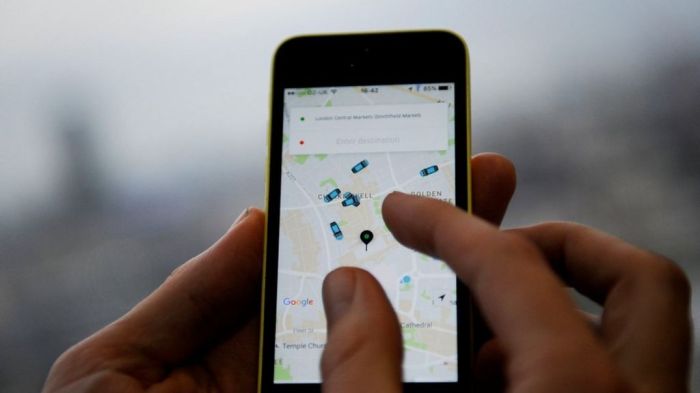Uber employees reportedly spied celebrities exes – Uber employees reportedly spied on celebrities’ exes—a bombshell revelation that throws the ride-sharing giant into the spotlight for all the wrong reasons. This isn’t your typical corporate scandal; we’re talking alleged targeted surveillance, potential privacy violations on a massive scale, and a whole lot of unanswered questions. Get ready to dive into a story that’s equal parts shocking and unsettling.
The allegations detail a disturbing pattern of employee misconduct, using sophisticated methods to gather sensitive information about high-profile individuals and their former partners. The potential legal ramifications for Uber are enormous, facing possible hefty fines and a serious reputational hit. But beyond the legal battles, this incident raises crucial ethical questions about data privacy, corporate responsibility, and the unchecked power of technology in the hands of those who might misuse it.
The Allegations
The recent revelations surrounding Uber’s alleged surveillance of celebrities and their ex-partners paint a disturbing picture of corporate overreach and potential ethical violations. While the company has addressed the issue, the details of the reported spying warrant a closer examination, considering the potential legal and reputational damage involved. The methods employed, the individuals targeted, and the information gathered all contribute to a complex narrative that raises serious questions about privacy and corporate responsibility.
Reports suggest that Uber employees utilized a variety of methods to obtain sensitive personal information. This included accessing and sharing ride data, potentially violating privacy agreements and breaching trust. Furthermore, allegations indicate that this information was not solely for internal use but may have been misused for personal gain or to influence external relationships. The scale of the alleged spying remains unclear, but the potential impact on those targeted is significant.
Uber employees allegedly spying on celebrities’ exes? Seriously, dude? That’s some next-level creepy, rivaling the drama of a poorly implemented reporting system, like the one Blizzard’s reviewing – check out this article on the blizzard review overwatch reporting system for a glimpse into the chaos. Maybe Uber should borrow a page from Blizzard’s playbook on improving their own internal oversight, before things get even weirder.
Methods Used in the Alleged Spying
Allegedly, Uber employees leveraged their access to internal systems to obtain private information about celebrities and their romantic partners. This included accessing ride data to track movements, potentially revealing locations, travel patterns, and associations. There are also claims that other forms of internal data were accessed and misused, though the specifics remain largely unconfirmed. The methods employed highlight a concerning vulnerability within Uber’s internal security protocols and the potential for abuse by employees with privileged access.
Individuals Targeted and Information Gathered
While the exact number of individuals targeted remains undisclosed, reports suggest that several high-profile celebrities and their exes were subjects of this alleged surveillance. The nature of the information gathered varied, ranging from simple location data obtained through ride history to potentially more sensitive details depending on the specific data accessed. The potential for this information to be misused for blackmail, harassment, or public shaming is a serious concern. The lack of transparency surrounding the full extent of the spying only exacerbates these worries.
Potential Legal Ramifications for Uber
The allegations against Uber could result in significant legal repercussions. Depending on the jurisdiction and the specific details of the case, potential charges could include violations of privacy laws, breaches of contract, and even potential criminal charges related to data theft or misuse. Class-action lawsuits from affected individuals are a strong possibility, as are substantial fines and regulatory penalties. The long-term impact on Uber’s reputation and its ability to maintain user trust will depend largely on the outcome of any investigations and subsequent legal proceedings. The precedent set by this case could significantly influence future data privacy regulations and corporate accountability.
| Allegation | Target | Method | Date |
|---|---|---|---|
| Access and sharing of ride data | Celebrity A and ex-partner | Unauthorized access to internal databases | Unspecified |
| Tracking of movements via ride history | Celebrity B and ex-partner | Internal system access | Unspecified |
| Potential misuse of other internal data | Multiple celebrities and exes | Unspecified methods | Unspecified |
Ethical and Privacy Implications: Uber Employees Reportedly Spied Celebrities Exes
The alleged spying activities by Uber employees, targeting celebrities and their exes, raise serious ethical and legal concerns that go far beyond simple breaches of company policy. These actions represent a profound betrayal of trust, impacting not only the individuals targeted but also the broader public perception of Uber’s commitment to user privacy and ethical conduct. The potential consequences are far-reaching and underscore the need for robust internal controls and a renewed focus on ethical decision-making within the company.
The alleged spying activities constitute a clear violation of privacy rights. Individuals have a reasonable expectation that their personal information, including their location data and travel patterns, will be protected by the companies they use. Uber, entrusted with this sensitive information, violated that trust by using it for purposes far outside the scope of its intended use. This is particularly egregious given the power imbalance between a massive corporation like Uber and private individuals. The unauthorized surveillance arguably constitutes an invasion of privacy, with potentially significant emotional and psychological repercussions for the victims.
Impact on User Trust
The revelation of these activities has undoubtedly damaged public trust in Uber. Users rely on companies like Uber to handle their personal data responsibly and securely. When that trust is violated, it can lead to a decline in ridership, negative publicity, and ultimately, financial losses. The damage to Uber’s reputation extends beyond its user base; it also impacts investor confidence and the company’s overall brand image. The long-term effects of this breach of trust could be substantial, potentially requiring years of rebuilding to regain public confidence. Similar incidents, such as the Cambridge Analytica scandal involving Facebook, demonstrate the significant and lasting consequences of data breaches and privacy violations on user trust and corporate reputation.
Proposed Policy for Preventing Future Incidents
To prevent similar incidents, Uber needs a comprehensive policy overhaul focusing on data security, employee training, and ethical oversight. This policy should include: a stricter data access policy limiting access to sensitive user information to only authorized personnel on a need-to-know basis; mandatory training programs for all employees on data privacy and ethical conduct, with regular refresher courses; the establishment of an independent ethics board to review and investigate potential violations; enhanced data encryption and security measures to prevent unauthorized access and data breaches; and transparent reporting mechanisms for employees to report potential ethical violations without fear of retaliation. Furthermore, the policy should incorporate regular audits of data access logs to detect and prevent suspicious activity. The implementation of such a policy would signal a genuine commitment to protecting user privacy and restoring public trust.
Impact on Uber’s Reputation and Brand Image
The allegations of Uber employees spying on celebrities and their exes have dealt a significant blow to the company’s already fragile reputation. Years of controversies surrounding workplace culture, safety concerns, and aggressive business practices have left Uber vulnerable to further negative publicity. This latest incident reinforces a pattern of behavior that casts doubt on the company’s commitment to ethical conduct and user privacy, potentially leading to lasting damage.
The potential long-term consequences for Uber’s business are substantial. Consumer trust is paramount in the ride-sharing industry, and this breach of trust could lead to a decline in ridership and driver sign-ups. Investors may also become wary, impacting the company’s stock value and its ability to secure future funding. Furthermore, regulatory scrutiny is likely to intensify, potentially leading to hefty fines and stricter oversight. This could significantly increase Uber’s operational costs and limit its growth potential.
Comparison with Similar Incidents
This incident echoes several other instances where major companies suffered reputational damage due to ethical lapses. The Cambridge Analytica scandal, for example, severely impacted Facebook’s image and led to widespread calls for greater data protection. Similarly, Volkswagen’s emissions scandal resulted in billions of dollars in fines and a lasting dent in its brand reputation. These examples demonstrate the far-reaching and long-lasting consequences of failing to prioritize ethical conduct and data privacy. The Uber situation is particularly damaging because it involves a direct violation of privacy, targeting high-profile individuals who are likely to amplify the negative press.
Strategies for Image Repair, Uber employees reportedly spied celebrities exes
To mitigate the damage, Uber needs a multi-pronged approach to repair its image. This should include a swift and transparent investigation into the allegations, followed by decisive action against any employees found to be responsible. A public apology acknowledging the severity of the breach and outlining steps to prevent future occurrences is crucial. Uber should also invest heavily in bolstering its data security measures and privacy protocols, demonstrating a genuine commitment to protecting user information. Proactive engagement with privacy advocates and regulators could help rebuild trust and show a willingness to cooperate. Finally, a focused campaign highlighting Uber’s positive contributions to the community and its efforts to improve its corporate culture could help counter the negative narrative. The success of these strategies will depend on Uber’s commitment to genuine change and its ability to demonstrate sustained improvement over time. The company needs to move beyond superficial PR efforts and implement lasting reforms to address the underlying issues that led to this scandal.
The Uber spying scandal isn’t just about celebrities; it’s a stark reminder of the vulnerabilities inherent in our increasingly data-driven world. The alleged actions highlight the urgent need for stricter regulations and a stronger emphasis on ethical data handling within tech companies. While Uber’s response remains under scrutiny, one thing is clear: this incident will have lasting implications for the company’s image, its relationship with users, and the broader conversation around privacy in the digital age. The ride-sharing revolution may have just hit a major pothole.
 Insurfin Berita Teknologi Terbaru
Insurfin Berita Teknologi Terbaru

